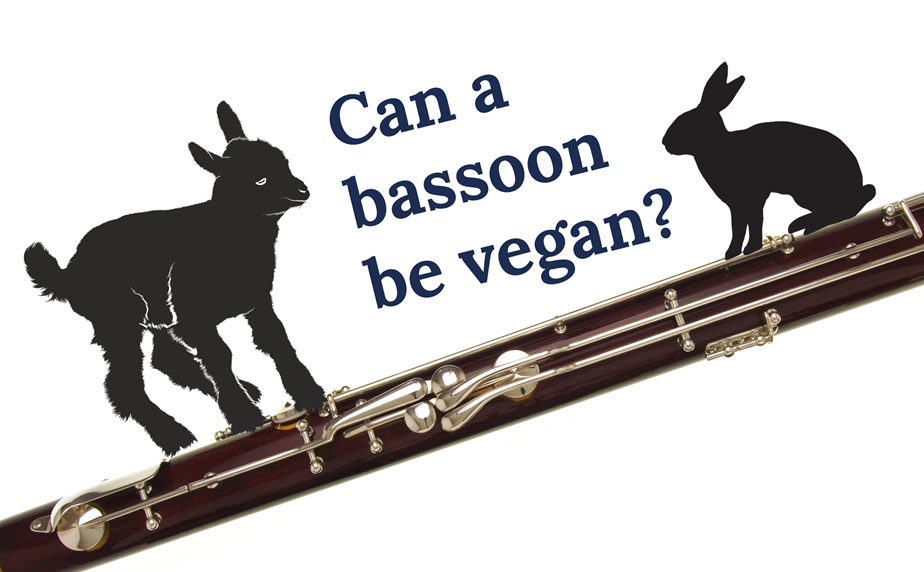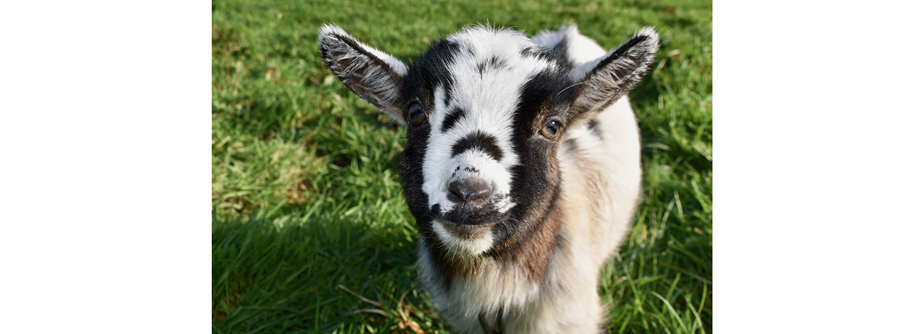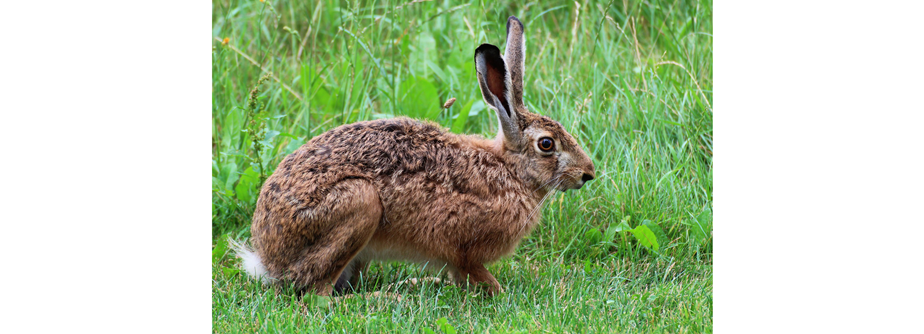Can a bassoon be vegan?
December 11th, 2020

Can a bassoon be vegan?
Can a bassoon be vegan?
How often do we, as musicians, think about how our bassoons impact the lives of animals?
What is my bell ring made of? What glue is under my corks? What material is on my pads? When you stop to think about it, ethical dilemmas jump out from under every key.
The majority of woodwind instruments throughout history have relied heavily on animal-based products – hide glue made from hare body parts, shellac made from the secretion of tropical insects, leather pads, ivory bell rings, woollen felts… and the list goes on
For the first time Double Reed Ltd. is able to make your bassoon (almost) completely vegan – nearly all of the materials which are commonly used in the construction of bassoons can be replaced with vegan alternatives. Not only do the new materials not contain any products derived from animals, but many of them are also superior to their animal-based counterparts.
A re-pad takes you 90% of the way there
For the last several hundred years, leather has been the predominant material used in bassoon pads. The majority of modern pads are made from kid (baby goat) leather. This is probably the most concerning material used on bassoons from a vegan point of view, since it is used most frequently and in the highest quantities.

But now, synthetic polymer-based materials have been developed which perfectly mimic the positive qualities of leather, and exclude the negative. These materials can be used in the construction of bassoon pads, creating completely vegan pads which are also superior to traditional leather.
Double Reed Ltd. is now able to offer full re-pads using new synthetic polymer-based pads!
How are our synthetic pads superior to leather?
1. Kid leather has many properties which make it ideal for use in pads – it is soft, durable and can be treated to be made non-porous, but it also has properties which are not so conducive for the hard life of a pad – substances can easily stick to it. Dirt and grease can cause leather pads to become sticky, leading to unwanted noise and infuriating difficulties playing certain notes.
Our synthetic pads completely solve this problem – they do not stick!
2. Leather, although durable, tends to go hard (and yellow) towards the end of its life, which causes leaks where the material no longer seats properly to the face of the bassoon. This in turn reduces the lifespan of leather pads, and their reliability becomes steadily worse as they age.
Our synthetic pads solve this problem as they do not go hard over time (or turn yellow)!
3. The porous nature of leather is also problematic - while leather can be treated to be non-porous, the treatment is not 100% effective, and only lasts as long as the substance applied remains viable on the leather.
Our synthetic pads are non-porous by their very nature, so they produce a better seal than leather, for a longer period of time.
Vegan pads are a little more expensive than traditional leather, and so a full re-pad is a little costlier, but for vegan-conscious bassoonists it would be worth considering replacing your pads now. And for everyone else, it would be worth specifying vegan pads and overhauls if your current pads are looking old and yellow and letting your bassoon-playing down.
So, synthetic pads are the biggest win for making a bassoon vegan – but what about the glue?
Traditionally shellac is used to glue bassoon pads into pad cups (it is often used on body bands too). Shellac is procured from the secretion of the lac bug found in the forests of India and Thailand.
We do not use animal-based shellac for our pads – we use a synthetic alternative which re-produces the properties of traditional shellac. In fact, none of the adhesives, greases or oils we use during the re-pad of a bassoon contain animal products.
Sometimes the glue used for sticking on bell rings and butt plates is hide glue, made from the hides of hares, but our workshop has dozens of types of purely synthetic adhesives which work just as well as hide glue.

Technically, if a bassoonist wanted to completely eradicate the use of animal-based adhesives from their bassoon, we could take the bell ring, butt plate, body bands and tenon corks off and replace the glue underneath with synthetic adhesive. While this may be taking the project to an extreme for most bassoonists, these tasks are relatively easy to do.
Beyond this, it gets complicated…
How far do you go?
If a bassoonist were motivated enough to want to eradicate all animal products from their bassoon, they would need to know what kind of adhesives have been used to glue in the wing joint liner (and what it is made from), and any fingerhole liners that are on the bassoon - aside from getting this information from the manufacturer, it is impossible to know. Yes, you could remove fingerhole liners and replace them using synthetic adhesives on the off chance the original glue was hide glue, but the wing joint liner is a much (much) bigger job, and in our opinion, highly unadvisable.
The issue comes down, in the end, to degrees of likelihood – how likely is it that these parts are glued in with (or made from) animal-based products? On modern instruments, one could argue it is unlikely, as synthetic products are much more common, and very effective.
What about the finish?
This, again, comes down to degrees of likelihood – how likely is it that the finish on your bassoon contains animal-based products? The majority of finishes used on bassoons are based on oil, plastic or plant-based resin, and the majority of varnishes within these categories do not contain animal products as a major ingredient. Shellac is the obvious exception, and there are some finishes which contain minor ingredients based on animal derived products, but the likelihood your bassoon contains these is relatively small due to the vast number of alternatives that are more commonly used. Shellac is quite easy to identify, but for most of these there is no sure-fire way of knowing what the finish contains, so a determined vegan bassoonist would need to either contact the manufacturer of their bassoon, or take the plunge and get it re-finished with a product they know is vegan.
Aren’t the felts wool?
The felt used on bassoon keys is often made from sheep’s wool, but we also stock synthetic microfibre fabrics which are just as effective.
Ivory bell rings
The use of elephant ivory is now illegal, but there are still many older bassoons with ivory bell rings. At Double Reed Ltd. we custom make bell rings from faux ivory, so if your ivory bell ring is a concern for you, it is worth knowing that there are alternative options available.
Are we completely vegan?
While we cannot claim to have a completely vegan workshop at Double Reed Ltd., we feel that vegan re-pads, glues, felts, and bell rings are a significant step forward for bassoonists who wish to adhere to a vegan lifestyle, and we use these materials where we can. The steps beyond this are a little more extreme, but apart from removing the wing joint liner and replacing the glue, all of them are achievable.
Get in touch if you are interested in making your bassoon vegan, or trying our new synthetic pads.
Article Author: Oliver Ludlow, In-House-Bassoon Specialist and Director at Double Reed Ltd.

News and guides

